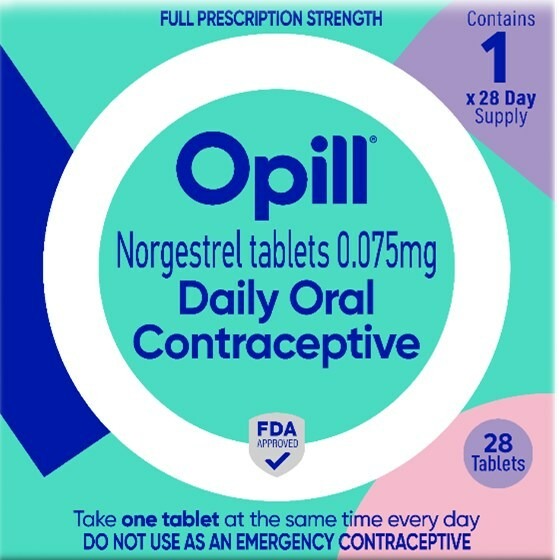Upholding the Right to Choose: The Imperative for Federal Protection of Over-the-Counter Birth Control Access
March 11, 2024
Overview
Network for Public Health Law Executive Director, Dr. Vineeta Gupta, explores the challenges and opportunities related to the new over-the-counter oral contraceptive Opill, including the potential for states to impose age-related restrictions on its purchase. Her perspective as a human rights lawyer and maternal health physician offers a comprehensive look at key areas to protect access to Opill.

In a massive win for reproductive rights, the United States is now providing over-the-counter (OTC) easier access to birth control, following the U.S. Food and Drug Administration’s (FDA) approval of Opill. The decision aligns with reproductive health services available in many parts of Latin America, most of Africa, India, and China. Globally, more than 100 countries permit OTC access to progestin-only pills.
Progestin-only pills (POPs), also called minipills, are a type of birth control pill that contains only one hormone, progestin. They work by thickening cervical mucus to make it harder for sperm to reach the egg and by thinning the lining of the uterus, making it less hospitable for implantation. Despite some of the limitations, including side effects, POP’s are highly effective and safe for the majority of women. Furthermore, the provided information on labels is well understood by people without clinical consultation.
The decision comes at a time when women’s rights are increasingly under siege, and the landscape of reproductive health in the U.S. is fraught with legal complexities and challenges that significantly affect individuals’ lives. The recent turbulence in Alabama, following a ruling that classifies fertilized eggs as children, and resulted in temporary closures of IVF clinics, underscores the precarious state of reproductive freedoms across the nation; it signals a troubling trend of encroachments on reproductive rights, with far-reaching implications.

While the approval of Opill to be sold OTC enhances contraceptive access, its availability raises critical questions about the potential for states to impose age-related restrictions on its purchase. Historical attempts by some states to enforce age restrictions on FDA-approved drugs highlight a contentious battleground between federal authority and state autonomy. Notably, federal law preempts state efforts to ban the sale of FDA-approved drugs, making any state-level “stop selling” laws unlikely to be successful. While precedent exists, the landscape is constantly shifting. Given the current politicization of the issue and the recent rulings of the Supreme Court, it is challenging to predict the exact outcome.
The stakes are high, particularly for marginalized communities who disproportionately face barriers to healthcare. Nearly half of all pregnancies are unplanned; according to the Center for Disease Control (CDC), “higher proportions of unintended pregnancies occur in adolescents and young women, women who are of racial or ethnic minorities, and women with lower levels of education and income,” making the issue of unintended pregnancy a pressing concern.
The ability to use contraception accurately and consistently can significantly reduce the risk of unintended pregnancy to as low as 5%. Yet, the accessibility of contraception remains a hurdle for many Americans, and demonstrates the importance of the federal government’s role in safeguarding the accessibility of OTC birth control.
The next steps towards ensuring widespread access to Opill across all socio-economic backgrounds, includes fostering collaborations, forming partnerships, and implementing innovative solutions.
Addressing the affordability of Opill stands out as a significant challenge. To tackle this, public-private partnerships, potentially with pharmaceutical companies, could improve financial obstacles by subsidizing costs or introducing a flexible pricing structure such as a sliding scale. Advocating for health insurance policies, such as Medicaid, to cover OTC birth control pills without a prescription, would augment access as well.
Distribution of comprehensive and culturally sensitive educational campaigns in multiple languages is crucial to combating the rise of misinformation and disinformation. Therefore, campaigns targeting healthcare providers, advocates, and the public, emphasizing the availability, effectiveness, safety, and correct usage of Opill, could bolster widespread adoption.
Particularly in underserved areas, partnerships with community organizations and advocates, including non-profits and faith-based organizations, have proven effective in supporting public health initiatives. So too, it would be beneficial in spreading awareness about Opill, and ensuring its distribution. Additionally, leveraging telehealth services and applications in urban and rural health deserts, to offer thorough contraceptive counseling and support, could significantly boost the acceptance of Opill as an OTC product.
The availability of Opill as an OTC birth control option is a critical step forward in addressing socioeconomic determinants of health and promoting reproductive health equity. By removing the barrier of a doctor’s visit, Opill empowers individuals, promoting greater autonomy and agency over their bodies. This increased autonomy can improve overall well-being and contribute to gender equality. It is a positive development for a more inclusive approach to reproductive healthcare across the U.S.
More work must be done to affirm and protect reproductive choices and access to OTC birth control, for the health and well-being of individuals and society at large. The fight for reproductive health equity is a marathon, not a sprint. Through unwavering advocacy, education, and community-driven efforts, equitable access for all will be secured.
Some relevant resources:
Medication abortion: a federal-state legal tug-of-war: https://www.networkforphl.org/resources/medication-abortion-a-federal-state-legal-tug-of-war/
Voter trends on ballot measures show support for reproductive rights: https://www.networkforphl.org/news-insights/voter-trends-on-ballot-measures-show-support-for-reproductive-rights/
Common themes and creative solutions to protect privacy of reproductive health data: https://www.networkforphl.org/resources/common-themes-and-creative-solutions-to-protect-privacy-of-reproductive-health-data/
Maryland’s approach to enhancing access to abortion: expanding scope of practice: https://www.networkforphl.org/news-insights/marylands-approach-to-enhancing-access-to-abortion-expanding-scope-of-practice/
Key health and policy changes supporting reproductive justice: https://www.networkforphl.org/news-insights/key-health-policy-changes-promoting-reproductive-justice/
Decriminalizing Abortion: How Our Movements Can Organize in Solidarity With Each Other: https://humanimpact.org/hipprojects/decriminalizing-abortion-how-our-movements-can-organize-in-solidarity-with-each-other/?strategy=advocacy
Michigan Becomes 20th State to Adopt Age-18 Sales Law on Cough Medicine: https://www.chpa.org/news/2019/11/michigan-becomes-20th-state-adopt-age-18-sales-law-cough-medicine
Federal law preempts a state law (SCOTUS 2013) in design defect claim against a generic drug manufacturer?: https://www.oyez.org/cases/2012/12-142
GenBioPro Case: https://wvpublic.org/abortion-pill-case-to-be-heard-by-the-u-s-supreme-court/
State and Federal Reproductive Rights and Abortion Litigation Tracker: https://www.kff.org/report-section/state-and-federal-reproductive-rights-and-abortion-litigation-tracker-federal-litigation/
Over-the-Counter Oral Contraceptive Pills: https://www.kff.org/womens-health-policy/issue-brief/over-the-counter-oral-contraceptive-pills/
Oklahoma Judge: Restrictions on Emergency Contraception Violate State Constitution: https://reproductiverights.org/oklahoma-judge-restrictions-on-emergency-contraception-violate-state-constitution/
2023 State Legislative Wrap-Up: https://reproductiverights.org/2023-state-legislative-wrap-up-report/
FDA preemption of conflicting state drug regulation and the looming battle over abortion medications: https://www.ncbi.nlm.nih.gov/pmc/articles/PMC10017072/
This article written by Vineeta Gupta, M.D., J.D., L.L.M., Executive Director of the Network for Public Health Law.
The Network for Public Health Law provides information and technical assistance on issues related to public health. The legal information and assistance provided in this document do not constitute legal advice or legal representation. For legal advice, readers should consult a lawyer in their state.
Support for the Network is provided by the Robert Wood Johnson Foundation (RWJF). The views expressed in this post do not represent the views of (and should not be attributed to) RWJF.
